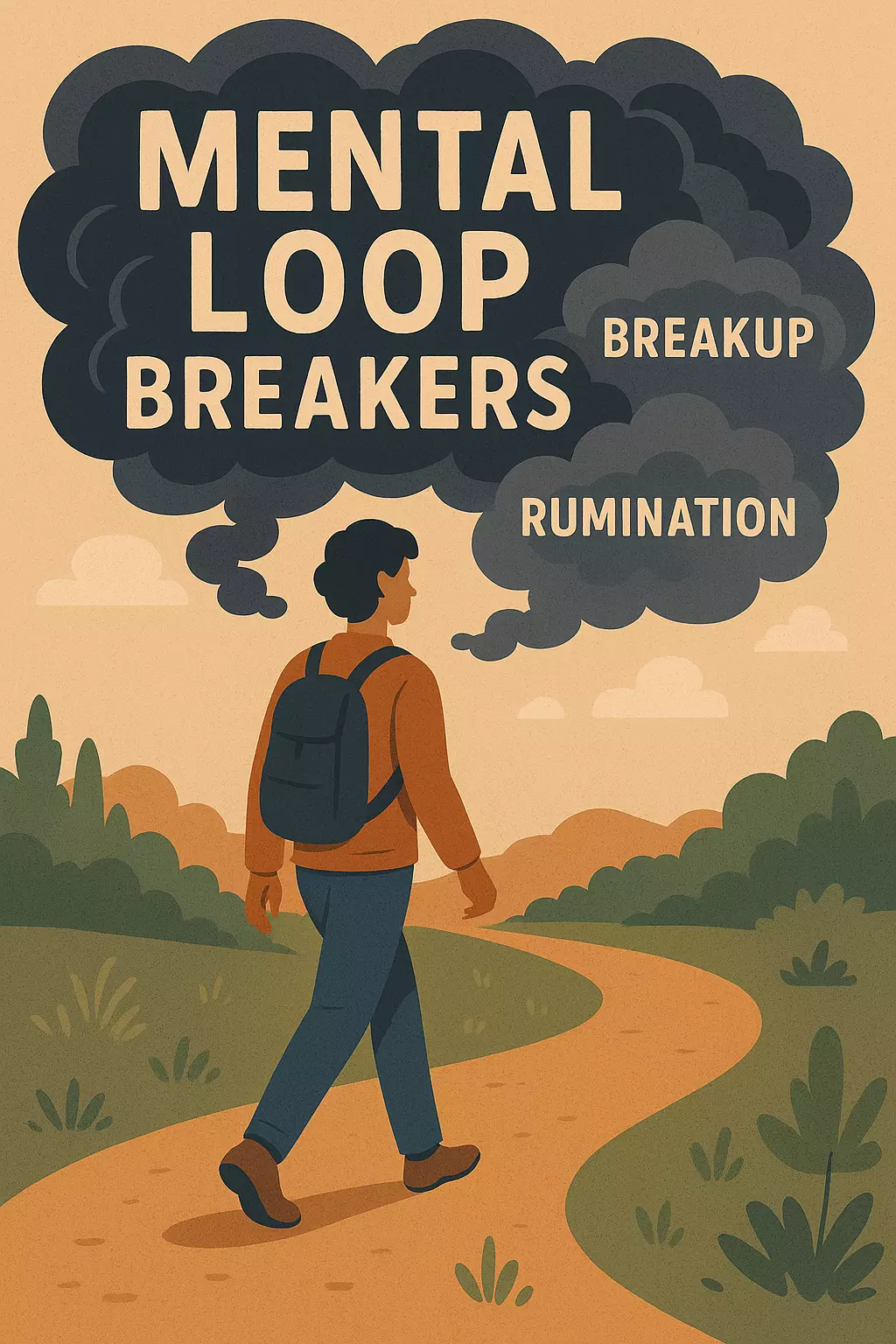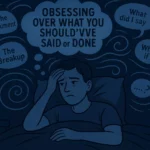Table of Contents
You’re brushing your teeth. Then suddenly—there it is again. That fight. That look. That final text.
Like a scratched record, your mind starts playing the breakup on loop. What you said. What they said. What you wish you’d said. You try to shake it off, but it’s like your brain won’t let you be. The day moves on, but you’re stuck in the same scene.
If this feels familiar, you’re not broken. You’re experiencing breakup rumination. And you’re not alone.
Let’s talk about why your brain keeps doing this—and how you can begin to stop.
Why does breakup rumination trap my mind when I want to move on?
Your mind is designed to solve problems. And when something as meaningful as love ends, the brain doesn’t treat it lightly. It goes into overdrive trying to understand what happened, how it could’ve gone differently, and—most painfully—why it hurts so much.
But here’s the twist: rumination doesn’t actually help you find answers. Research shows it often does the opposite. One study found a strong correlation between rumination and lingering emotional attachment. The more you think about your ex, the more emotionally tied you stay. In trying to gain closure, you reopen the wound. Again and again.
Your brain means well. It’s trying to protect you from the unknown. But it gets caught in a loop of analysis without resolution.
The key isn’t to force forgetting—it’s to gently redirect. Practices like structured journaling, creative distraction, and deliberate attention shifts can help loosen the knot. Your mind doesn’t need to solve the past. It needs to feel safe moving forward.

Why Breakups Hurt So Much (Science of Heartbreak & Healing)
Let’s examine breakups in: Biology of love & loss, Attachment styles, Rejection psychology, Closure, Rumination, Grief
Tap here to read more →
Why does breakup rumination drain me mentally and physically?
You’re not imagining it. Rumination has a cost—and your body pays the bill.
In a 2025 study, researchers found that those who fixated on their breakup showed real drops in performance, health, and focus. That “fried” feeling after overthinking? It’s not just fatigue—it’s your cognitive system running on fumes. Rumination activates stress responses, drains your mental bandwidth, and even suppresses immune function over time.
This means the fog in your brain, the ache in your chest, and the tiredness in your bones are not just emotional—they’re physiological. The spiral isn’t just tiring. It’s depleting.
When you interrupt the loop, you reclaim resources. You allow your nervous system to shift out of high alert. You create space for things like rest, clarity, and even joy. Recovery isn’t just emotional—it’s biological.

Why is it so hard to sleep when breakup rumination takes over?
The lights are off, your phone is down, and yet—the movie starts playing. That moment. That message. That memory. It’s like your brain saves the worst reels for bedtime.
This isn’t just poor timing. It’s science. Rumination stimulates the stress pathways in your body—exactly when your system needs to be winding down. A 2023 study showed that breakup-related rumination significantly disrupted sleep, keeping people locked in insomnia and restless nights.
And when you don’t sleep? Healing slows down. Emotion regulation weakens. Pain feels sharper. It’s a vicious cycle.
Breaking it might mean new bedtime rituals—writing thoughts down before they spiral, practicing body-based calm (like breathwork or gentle movement), or shifting focus to sensory cues instead of mental narratives. Sleep is where healing accelerates. Protecting it is not indulgent—it’s foundational.
The gentle truth
Breakup rumination feels like it’s helping you understand. But often, it’s just keeping you in place.
Letting go isn’t about forgetting. It’s about freeing your mind from the constant search for what went wrong. It’s trusting that you can carry the lessons without carrying the loop.
And when the thoughts come back—and they will—may you meet them not with fear or frustration, but with a new kind of skill: the ability to notice, to pause, and to gently, consciously return to your life.
FAQ
Q1. Why does my mind keep replaying the breakup even when I want to move on?
Because your brain is trying to resolve emotional conflict but ends up stuck in analysis loops. Rumination doesn’t solve the pain—it prolongs it.
Q2. Why do I feel so mentally and physically exhausted from this?
Rumination drains your mental bandwidth, elevates stress, and impairs both health and focus. It’s a full-body experience.
Q3. Why can’t I sleep after a breakup?
Rumination activates your stress system at night, making restful sleep harder. You’re not imagining the insomnia—it’s a real side effect.
Q4. How do I stop ruminating?
You don’t stop it cold—you redirect it. Use tools like journaling, mindfulness, distraction, and body-based calming practices.
Scientific Sources
-
Stefania Mancone, Giovanna Celia, Fernando Bellizzi, Alessandra Zanon & Pierluigi Diotaiuti (2025): Emotional and cognitive responses to romantic breakups in adolescents and young adults: the role of rumination and coping mechanisms in life impact
Key Finding: Rumination significantly predicts negative outcomes in academic performance and physical health. Avoidance coping mediates the link between rumination and emotional distress.
Why Relevant: Demonstrates how rumination impairs functioning and shows coping strategies can be used to break the mental loop.
https://www.frontiersin.org/articles/10.3389/fpsyt.2025.1525913 -
Nguyen Thi Loan, Tong Thi Khanh Minh, Nguyen Vu Thanh Truc, Tran Thien Hoan My (2023): The Mediating Role of Rumination in Breakup Distress After Romantic Relationships and Sleep Disturbance of the Students
Key Finding: Rumination mediates the relationship between breakup distress and sleep disturbance in university students.
Why Relevant: Links rumination to poor sleep—highlighting a physiological loop that can be broken with targeted strategies.
https://namibian-studies.com/index.php/JNS/article/view/2909 -
A. Petak et al. (2025): The Role of Rumination and Worry in the Bidirectional Relationship between Stress and Sleep Quality
Key Finding: Increased rumination predicts poorer sleep quality, creating a feedback loop between stress, rumination, and disrupted rest.
Why Relevant: Emphasizes how rumination sustains emotional and physical dysfunction, reinforcing the need to interrupt the spiral.
https://www.mdpi.com/1660-4601/22/7/1001
- Soothing the Spiral: Grounding Techniques for Breakup Rumination That Really Work
- Breakup Rumination Trap: Why You Stalk Their Socials (and How to Stop)
- Powerful CBT for Rumination: Break Free from Heartbreak Loops
- Breakup Rumination: Why You Can’t Stop Thinking About the Pain of the Past
- Breakup Rumination Hell: How to Escape the Pain Loop for Good
- Powerful Writing Therapy for Rumination: Find Peace After Heartbreak
- Breakup Rumination Relief: Powerful Ways to Interrupt the Thought Spiral
- Dopamine and Breakup Rumination: The Surprising Science Behind Why You Can’t Stop Thinking About Your Ex
- Breakup Rumination: The Powerful Truth About Why You Can’t Stop Thinking About Them










Leave a Reply